| 1 |
CLT Talk on “Blended Learning and the Future of Education”
Speaker: Ms Kristina a/p Francis
Date: 29 March 2018,
Time: 2 - 4pm,
Venue: A003 (Auditorium), Block A, Heritage Hall, UTAR Kampar.
With the aim to educate UTAR academics and students about effective teaching and learning, the Centre for Learning and Teaching (CLT) successfully organised a talk titled “Blended Learning and the Future of Education” at Kampar Campus on 29 March 2018.
The invited speaker was Faculty of Arts and Social Science (FAS) lecturer Kristina Francis. The objective of the talk was to provide participants with an overview of blended learning and its importance as well as the ways on how to incorporate blended learning into the teaching and learning programmes.

Kristina delivering her insights on blended learning
The talk session started with an introduction to E-learning. There are few types of E-learning, among them are distance learning, the education of students who may not always be physically present at a school; hybrid learning, which combines face-to-face classroom instruction with online activities that reduces the amount of seat time in a traditional face-to-face course and moves more of the course delivery online; and blended learning, that combines online digital media with traditional classroom methods. Blended learning requires the physical presence of both educator and student, with some element of student control over time, place, path, or pace. Blended learning is considered as a unique approach that aims to develop quality education.
Traditionally, in foreign practice they allocate six models of blended learning, namely face to face driver, rotation model, flex, online lab, self-blend and online driver.
Kristina explained, “In the field of education, the most frequently asked question is “what actually works” in order to enable students to learn efficiently. One of the current popular ways of teaching and learning would be adopting the blended learning approach, which allows the educator and students to thrive in their academic pursuits using advancements of educational technologies. Technologies should be utilised in the teaching and learning contexts. But, how are we going to implement that in the classroom? How are we going to design modern learning experiences for students? And in the perspective of students how are they going to react and respond?
Kristina further elaborated that, the use of blended learning environments in higher education has rapidly increased in the 21st century. Tools and techniques that were initially used in the experimental distance education courses are today part of mainstream education with blended learning as a continuum between traditional face-to-face teaching and purely online courses. Among the popular blended learning tools available online are TED-Ed, Google Classroom, PlayPosit, Edpuzzle, Blubbr, LessonPaths and Kahoot.
She described, “Blended learning is a combination of offline, namely face-to-face, traditional learning and online learning in a way that one compliments the other. Blended learning provides individuals with the opportunity to enjoy the best of both worlds. For example, a student might attend classes in a real-world classroom setting, and then supplement the lesson plan by completing online multimedia coursework. Creating a blended learning environment for students can be very challenging for the academics. However, blended learning is important because it breaks down the traditional walls of teaching, one that does not work for all students and now with access to present day technologies and resources we can tailor the learning experience for each student.”
In her talk, Kristina also spoke about the advantages of blended learning. She said, “Blended learning offers flexibility in terms of availability— anytime, anywhere. It provides access to global resources and materials that meet the students’ level of knowledge and interest. Apart from that, blended learning strategies also offer effectiveness and efficiency, besides providing a platform for students to develop their critical thinking and creative skills.”
She added, “Blended learning sounds like a dream for students and academics. Theoretically, class time is reduced, and the process of instruction is modernised through the use of technology. However, blended learning gives unique challenges that can become barriers to learning. Among the challenges are technological issues, inadequate exposure, inadequate training, lack of internet access and expensive technology.”
She concluded, “UTAR is one of the higher learning institutions that should emphasises on blended learning and its current focus is on the importance of education in the fourth industrial revolution. Blended learning will be a good platform for coping with the growing demands of education in the current wave of the industrial revolution. In addition, blended learning also promotes a shift towards lifelong and interactive learning in UTAR.”
Kristina is currently an academic staff member of the Department of Language and Linguistics of FAS, UTAR. A PSMB certified trainer, she has been involved in English language teaching and teacher training for over four years. Her core interest is focusing on the designing of flipped massive open online courses (fMOOCs) module based on higher order thinking skills (HOTs). Her expertise includes blended learning. She is experienced in the techniques of creating or developing meaningful and useful learning using Web technological tools.
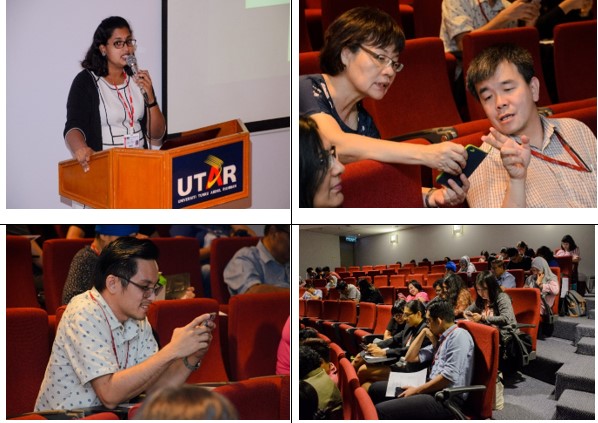
Participants being engrossed with some of the interactive activities
|
| 2 |
CLT participation in the UTAR Cross-disciplinary R&D Colloquium 1.0
Organised: Institute of Postgraduate and Research
Date: 21 April 2018.
Venue: LDK 1, 2 and 3, Block L, UTAR Kampar
CLT participated in the UTAR ninth R&D Colloquium 2018 (1.0) which was organised by the Institute of Postgraduate Studies and held at Kampar Campus on 21 April 2018. The objective of the colloquium was to offer a platform to exchange research ideas, interests and project funding related to the cross-disciplinary topic areas. Presenters were encouraged to present early-stage research plan in order to receive some valuable feedback and suggestions. It also aimed to develop cross-disciplinary collaborations at a concrete level through finding synergies and common interests.

Group photo of Prof Lee with presenters and participants of the Colloquium
In his opening speech, UTAR Vice President for R&D and Commercialisation Prof Ir Dr Lee Sze Wei said, “I’m glad to be part of this colloquium for the past five years and it is indeed a great platform for all researchers to share their research methodologies and findings with other researchers and students. This colloquium also aims to help the participants to develop their analytical skills and engage in multi-disciplinary research. I believe this year’s themes will give deeper understandings to participants about the future global challenges and demands.”
The one-day conference continued to strengthen and nurture regular interaction between researchers from the 32 research centres in UTAR by establishing research collaborations and reinforcing cross-disciplinary research. It also served as a platform for a continuous update on research outcomes to the research centres, faculties, IPSR, and the Vice President’s office for R&D and Commercialisation.
A total of 34 presentations on various topics including medical tourism, social media, foodborne infection, infant mortality rates, stem cells, mental health, cyber bullying, artificial intelligence, social economic impact, eco-friendly smart house, e-commerce and fourth industrial revolution, were delivered.
CLT was represented by Dr Gerard Sagaya Raj and Mr Wong Kin Tat, both of whom presented on “The Malaysian University English Test and its Predictive Validity for Admission Purpose and Academic Performance".
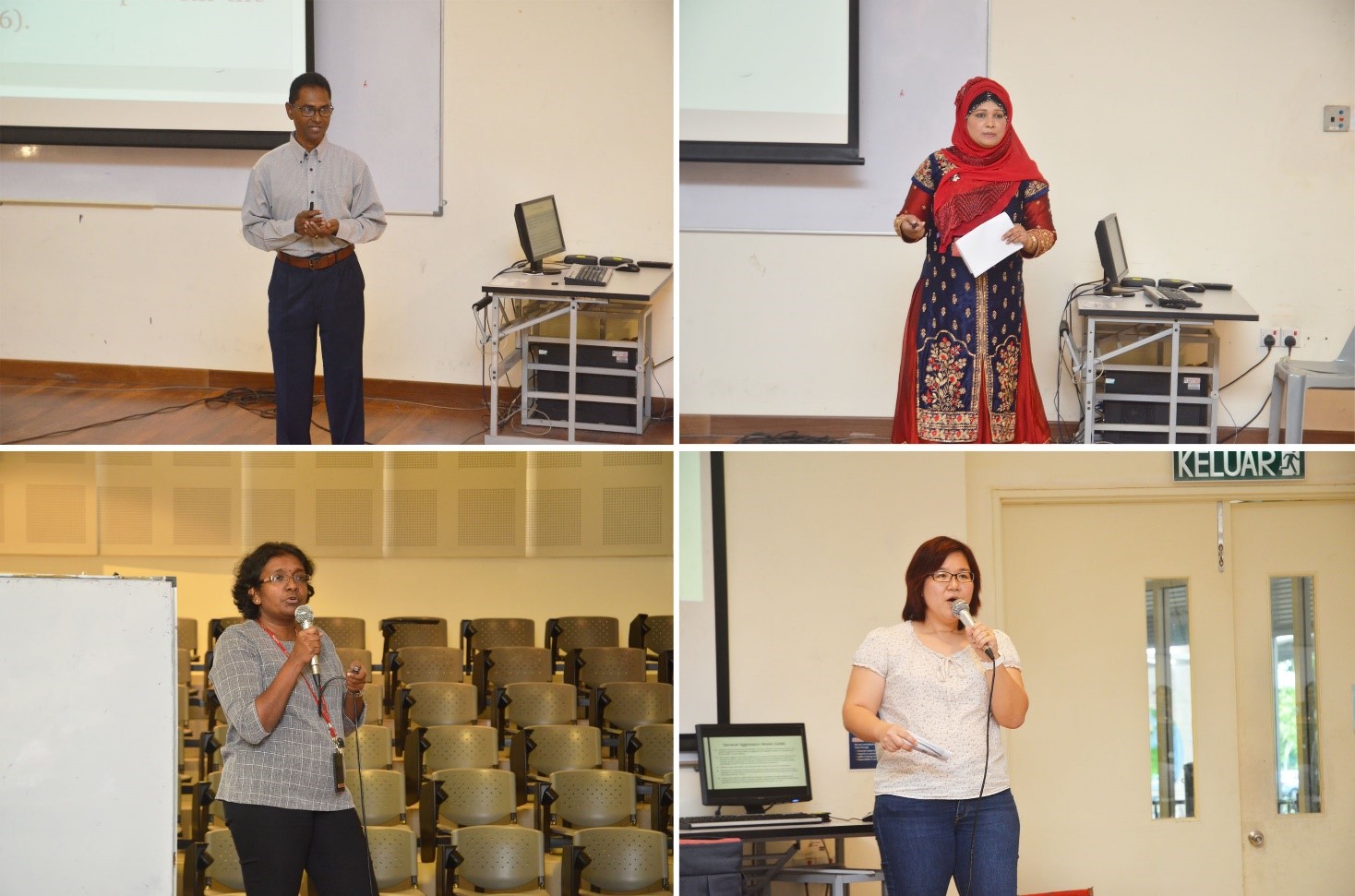
Presenters, clockwise from top left: Dr Gerard, Dr Sultana, Dr Tan and Dr Sumathi
There were three sessions held concurrently with three themes, namely ‘Healthcare and Wellness’, ‘Disruptive/Advanced Technology’ and ‘Societal Impact of 4.0 IR’.
Among the highlights were:
- Assoc Prof Dr Tang Pek Yee’s presentation on “A potential link between opioid addiction (use or abuse) and schizophrenia-like behaviour”,
- Dr Fong Lai Yen’s presentation on “Investigation of the effects of asiatic acid on pre-lesional atherogenic events in vitro and atherosclerotic lesion formation in vivo”,
- Dr Leong Kah Hon’s presentation on “Silver Sulfide Quantum Dots Based Photocatalyst for Enhanced Absorption of Solar Light”,
- Dr Sin Jin Chung’s presentation on “Photocatalysis for environmental and energy applications”,
- Dr Alice Khaw Mei Kum’s presentation on “RFID Sensor Transponder with multiple energy-harvesting sources”,
- Dr Sumathi Sethupathi’s presentation on “Carbon Dioxide Methanation via Aluminum-Water Interface: Determination of Reaction Mechanism and Stability”,
- Dr Joanna Tan Tjin Ai’s presentation on “The social impacts of cyber bullying on psychosocial health: The mediating effects of primary appraisal and coping strategies in general aggression model”,
- Dr Sujan Chowdhury’s presentation on “Role of Elaeis guineensis (Oil Palm) mediated synthesis of stabilised Zinc-colloid nanoparticles over the Rubber waste effluent treatment”,
- Dr Ngoo Yee Ting’s presentation on “Entrepreneurship Intention Among Malaysia Undergraduates in E-Commerce: An SEM-PLS Approach” and
- Dr M Sultana Alam’s presentation on “An investigation of Gender Disparity in Malaysian Higher Educational Institutions (HEIs)”.
|
| 3 |
CLT participation in the Guangxi-Malaysia Higher Education Collaboration Forum 2018
Date: 11 May 2018,
Time: 9am to 5pm.
Venue: KB209 & KB213, Block KB, UTAR Sungai Long.
CLT participated in an international forum which witnessed the collaboration between the Ministry of Higher Education Malaysia (MOHE) and Guangxi Education Department (GED) of Ministry of Education, China. The forum was held in Sungai Long Campus on 11 May 2018.

Group photo session after the opening ceremony
“This forum aimed to bring together esteemed researchers and academics with specialisation from various fields ranging from education, environmental sciences and Chinese medicine to medical, electrical and electronic engineering,” said UTAR President Ir Prof Academician Dato’ Dr Chuah Hean Teik during his opening remarks.
Also present at the opening ceremony were Director General of Department of Higher Education Datin Paduka Ir Dr Siti Hamisah Tapsir, Inspector-General of GED Prof Tang YaoHua, MOHE Director of Excellence Planning Division Prof Dr Raha binti Haji Abdul Rahim, GED Director of Science, Technology and Information Mr Huang Qing Yun, UTAR Vice President for R&D and Commercialisation Prof Ir Dr Lee Sze Wei, UTAR Vice President for Internationalisation and Academic Development Prof Ir Dr Ewe Hong Tat, academics and researchers from local and China universities and UTAR staff.
The local delegates were from Universiti Malaya, Universiti Putra Malaysia, Universiti Kebangsaan Malaysia, Universiti Sains Malaysia and UTAR. Meanwhile, the China delegates were from Guangxi University, Guangxi Normal University, Guilin University of Technology, Guilin University of Electronic Technology and Guangxi University of Chinese Medicine.
The forum was highly endorsed by GED. Prof Tang during his opening speech said, “To make this event a reality, GED accepted the proposal as soon as possible. I also did a video conferencing with Director General of MOHE at the end of November 2017. Since then, constant communication remained between GED and MOHE.”
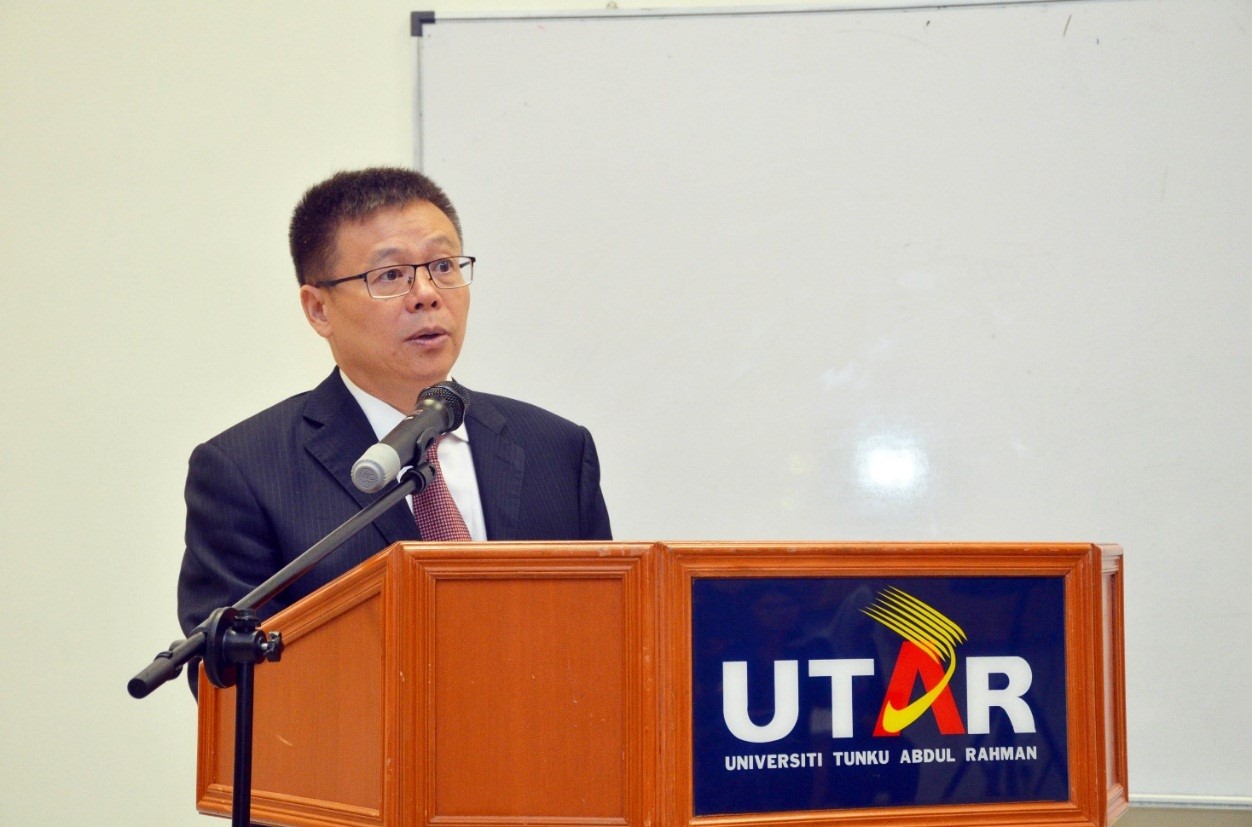
Prof Tang during his opening speech
“The purpose of this forum is for us to work together, learn from each other and enhance the congressional opportunities. It is hoped that the findings from the forum will spearhead further activities that would fulfil the needs of Malaysian and Chinese universities ultimately the society and community in both countries. MOHE has been showing interest in establishing another collaboration partnership with GED. The collaboration will see benefits for lecturers and students from both countries. We hope through this initiative, the number of post-doctoral programme and students will increase,” said Datin Paduka Siti Hamisah.
The forum began with a keynote speech from Prof Raha and Prof Tang. According to Prof Raha, Malaysian lecturers have collaborated with a total of 186 countries among 195 countries in the world.
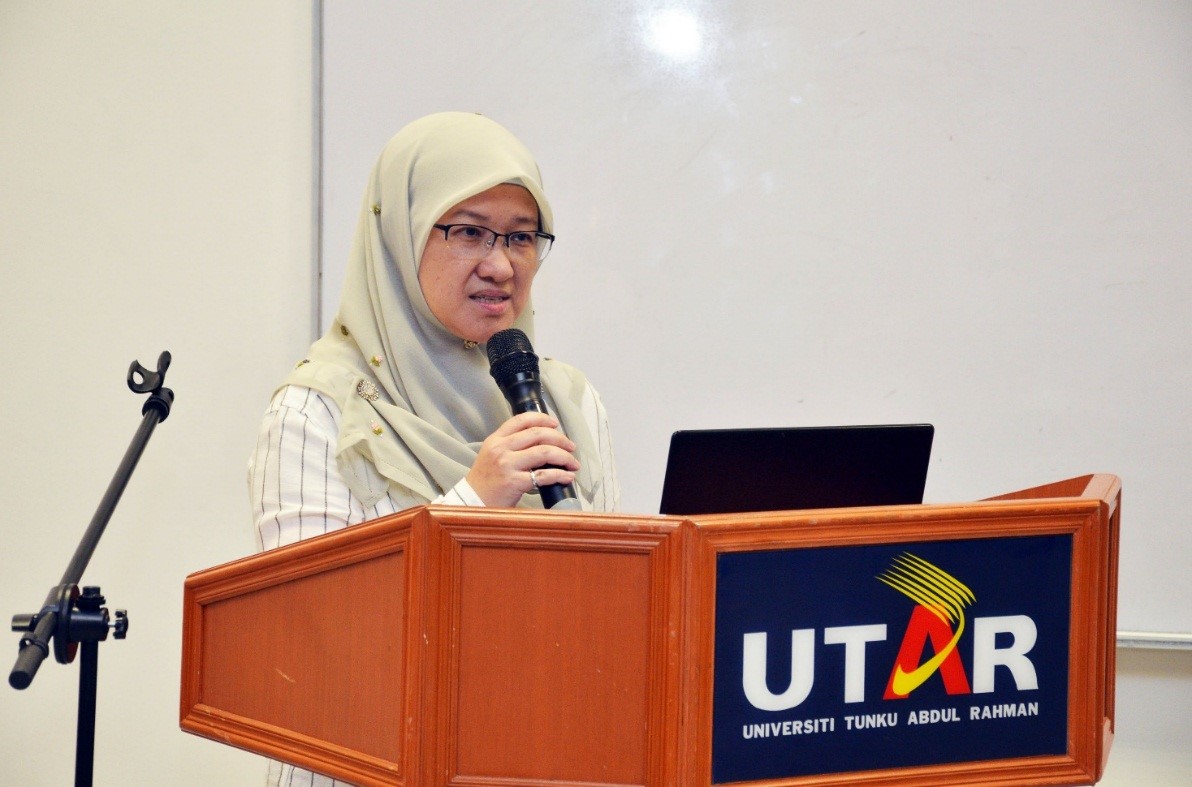
Prof Raha giving her keynote speech
The forum was followed by three hours of intensive discussion among the academicians and researchers. CLT was represented by Dr Ngeow Yeok Meng who assumed the role of the rapporteur, Dr Chen Kah Pin and CLT Chairperson, Ms Winnie Er Pek Hoon. CLT’s discussion session was held at KB213, under the theme of “Education”.
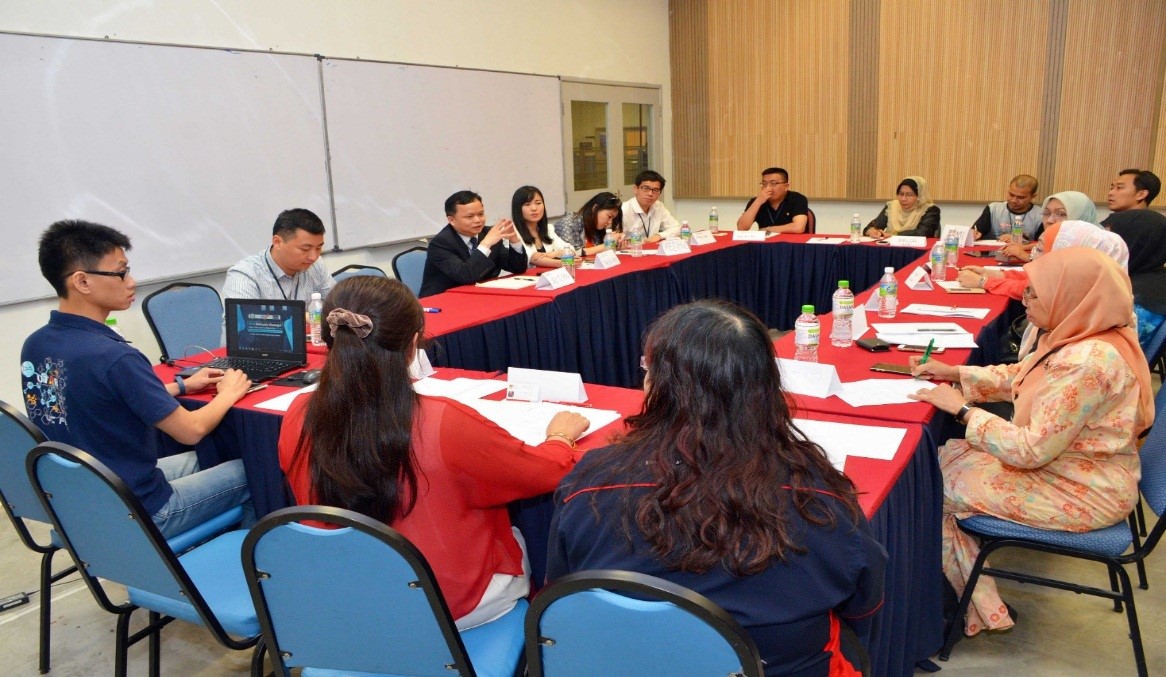
Discussion session in which CLT participated
Before the forum concluded, academicians and researchers shared their discussion and outcomes for future joint collaborations. Some highlighted outcomes were dual degree mutual recognition initiative where degree certificate from UTAR can be used to apply for Chinese Medicine Practicing Certificate, encourage joint supervision of postgraduate students and paper publications, suggestion to organise another round of forum within this year, a special visit to Guangxi Normal University for innovative teaching and learning, and collaboration opportunity on satellite navigation and location services.
In support of dual degree arrangement between Malaysia and China, Prof Lee said, “Government fully supports dual degree arrangement between Malaysia and China. I believe some universities including UTAR are already implementing dual degree arrangement with foreign universities. Therefore the same framework can be applied.”
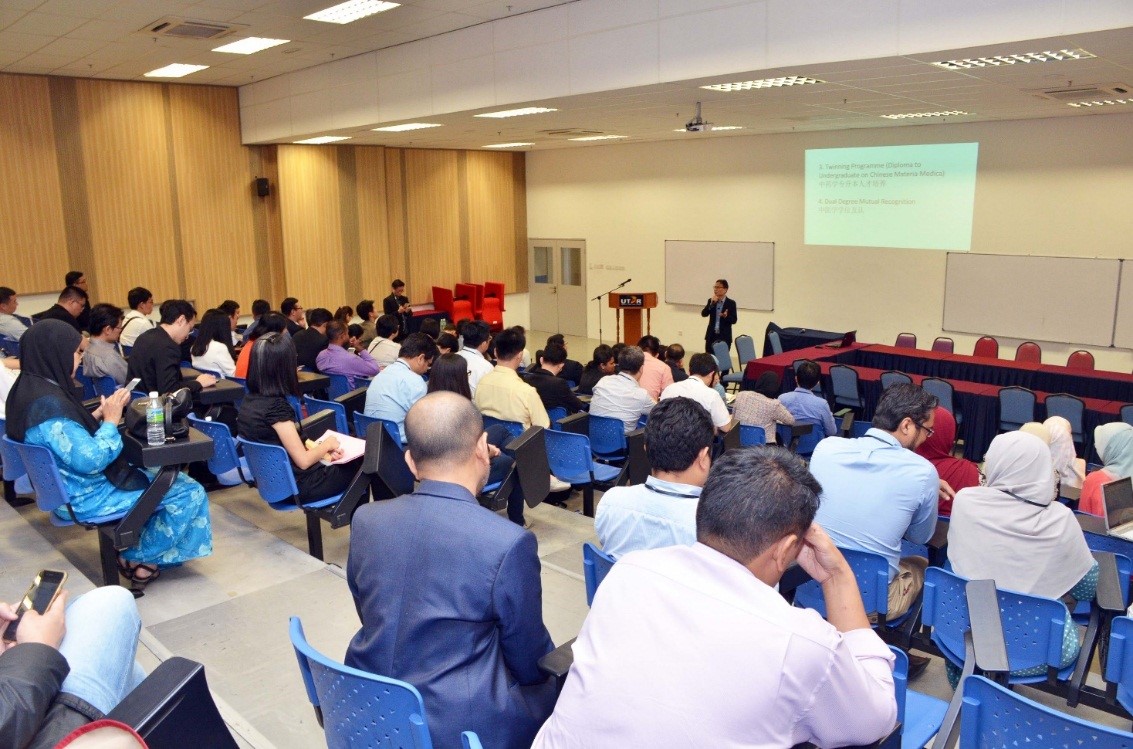
Prof Lee during the closing ceremony
Meanwhile, on Guang Xi University’s part, Prof Tang hopes that academics and researchers from the various fields will cherish the opportunity to communicate sincerely and fully express their opinions through which he hopes collaboration agreement or consensus direction can be reached.
|
| 3 |
CLT Talk on “Blended Learning and Flipped Classroom”
Speaker: Dr Robert Chen
Date: 24 May 2018,
Time: 10am-1pm.
Venue: KAG03, Block KA, UTAR Sungai Long,
The Centre for Learning and Teaching in collaboration with the Faculty of Accountancy and Management organised a talk titled “Blended Learning and Flipped Classroom” at Sungai Long Campus on 24 May 2018. Present at the talk were Centre for Learning and Teaching Chairperson Er Pek Hoon, Organising Chair T. Saraswathy, Deputy Organising Chair Dr Tan Pei Meng, a speaker from the Faculty of Medicine and Health Sciences, Assoc Prof Dr Robert Chen and lecturers from various faculties.
The talk aimed to provide UTAR academics with a platform to discover the Blended Learning and Flipped Classroom and to give an understanding about the importance of implementing the Blended Learning and Flipped Classroom approach for a better learning and enhance the teaching quality.
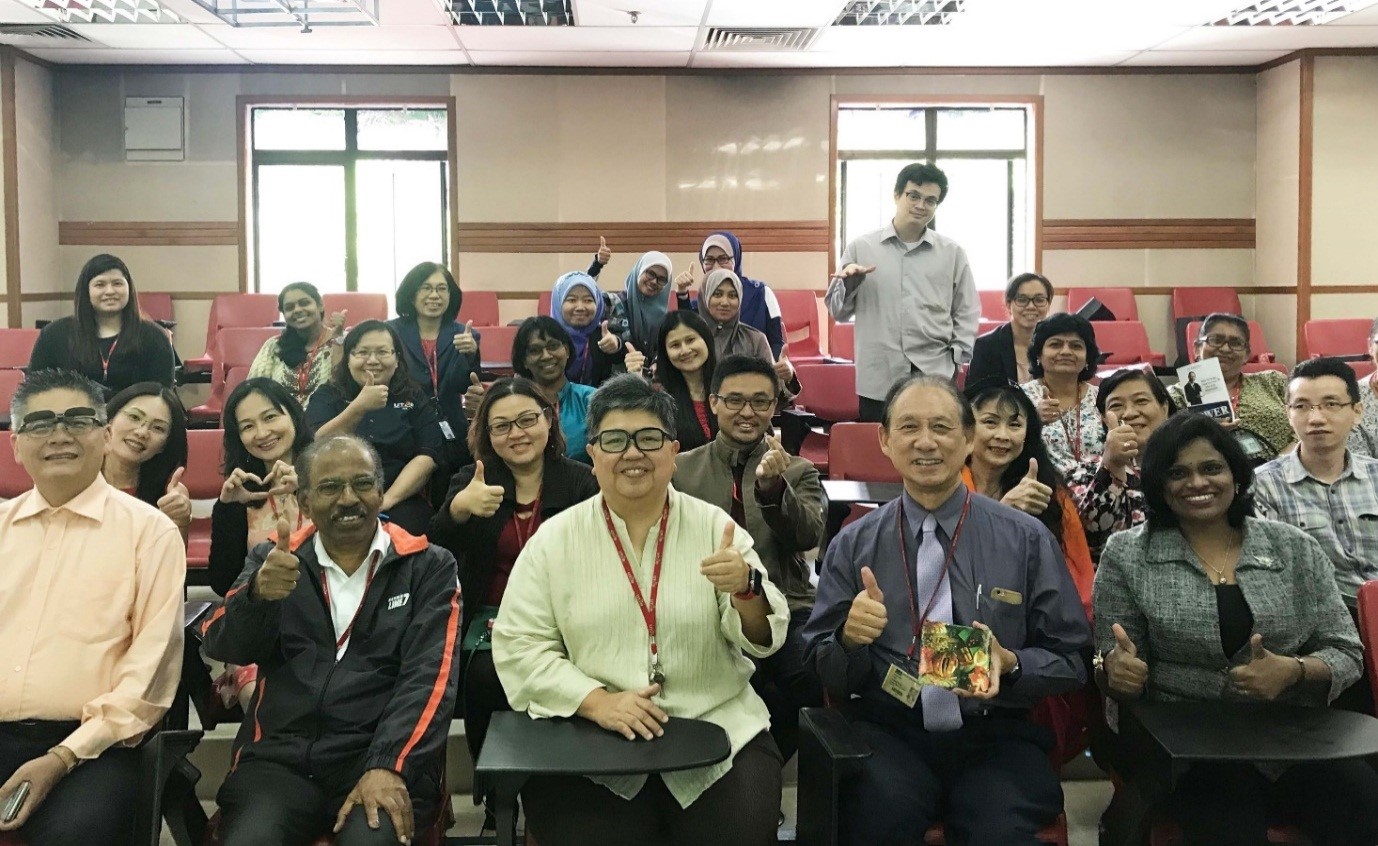
Group photography session
The talk began with an ice-breaking session among lecturers who participated in the getting-to-know-you game. The game required participants to exchange names and faculty while answering questions based on the card given.
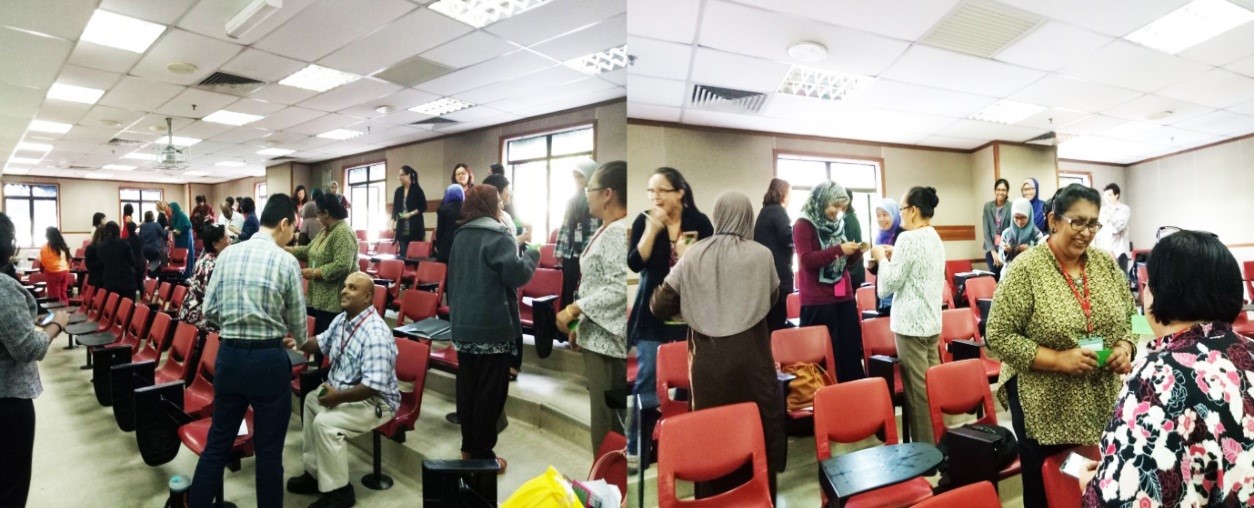
Participants interacting during the game session
During the event, Dr Robert Chen gave an introduction on Blended Learning and Flipped Classroom through video presentations before proceeding with the comparison between the conventional method of learning and the Blended Learning and Flipped Classroom method. He mentioned the advantages and disadvantages of practising the Blended Learning and Flipped Classroom method in classes. Some of the advantages of Flipped Learning include students collaborating with peers, hands-on projects in the classroom, students preparing topics before entering the classroom and many more.

Dr Robert Chen delivering his talk
He said, “The traditional method of learning creates passive learning whereby practice is separated from teaching. There is a lack of collaboration among students which leads to fast learners getting bored and slow learners getting left behind as there is no individualised attention for the students. Flipped learning, on the other hand, enables students to review the course material for further understanding and learn at their own pace because not every student are the same. This way, we cultivate students who are responsible for their own learning and it will encourage them to practice at different levels.”
The participants were also given a group task to create a flipped learning session based on the present course and it was followed by group presentations and Q&A session. Dr Robert Chen also shared tips in handling flipped learning classes and creating videos as learning materials.
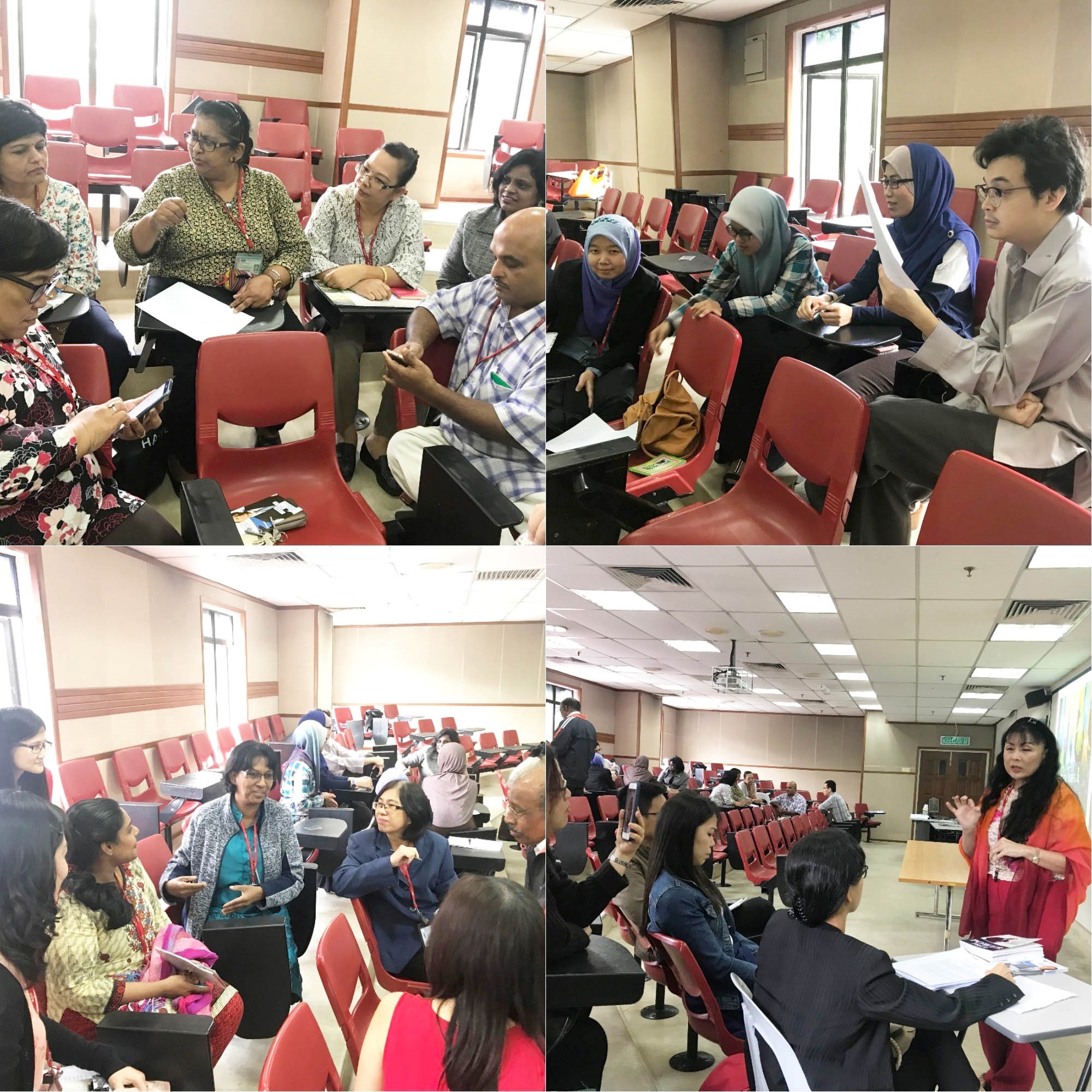
Group discussion on Flipped Classroom
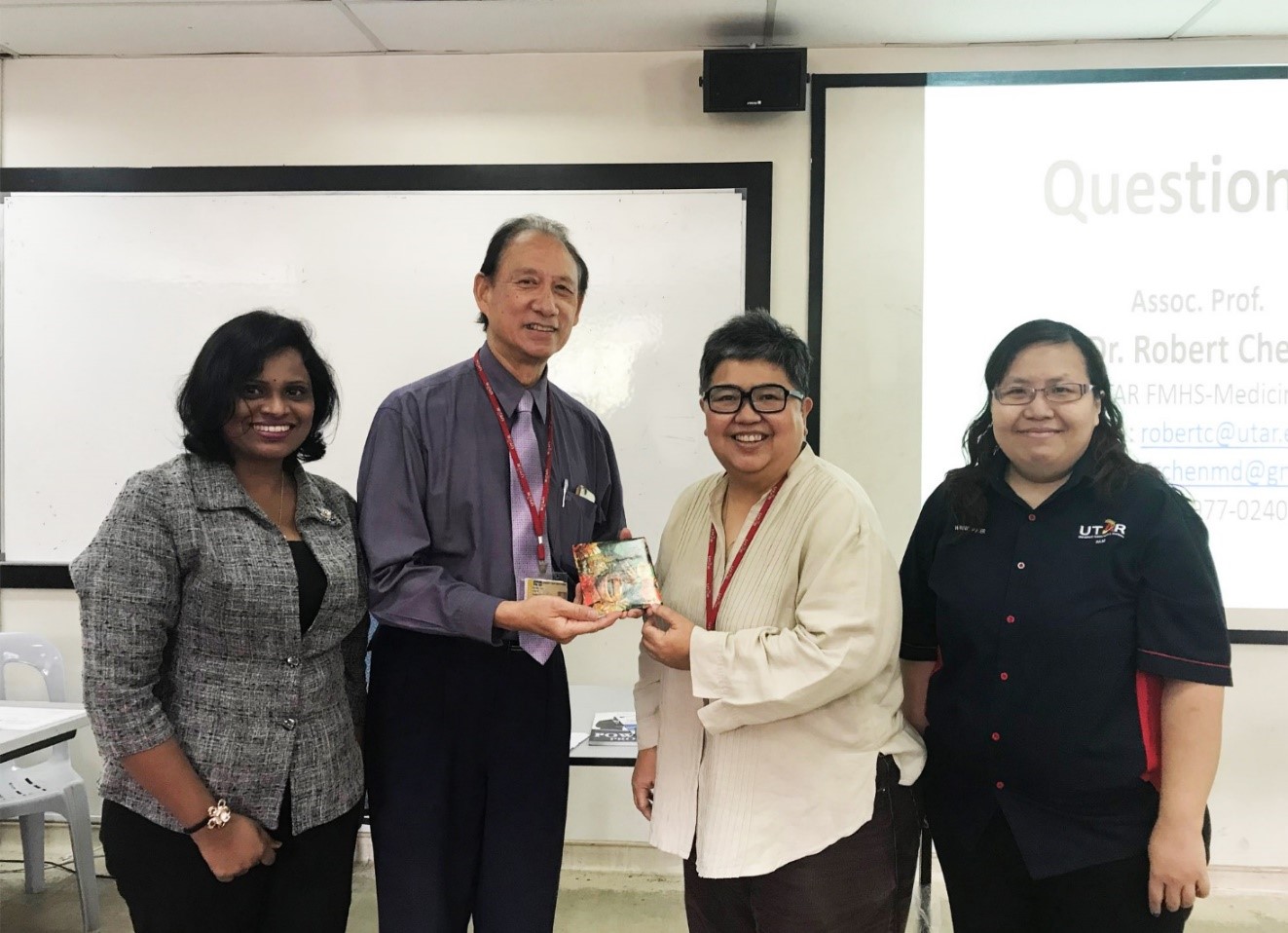
Faculty of Accountancy and Management Dean Dr Sia Bee Chuan presenting the token of appreciation to Dr Robert Chen while Er (far right) and T. Saraswathy (far left) look on.
|
| 4 |
CLT Talk on “What’s new in ethics of human subject research?”
Speaker: Dr Cheah Phaik Yeong
Date: 1 June 2018.
Venue: M floor, Block KA, UTAR Sungai Long,
The Centre for Learning and Teaching (CLT) and the Faculty of Medicine and Health Sciences (FMHS) organised a talk titled “What’s new in ethics of human subject research?” at Sungai Long Campus on 1 June 2018.
Invited to deliver the talk was Dr Cheah Phaik Yeong, an Associate Professor of Oxford University based in Bangkok at the Wellcome Trust Major Overseas Programme. She is currently the Head of Bioethics and Engagement Department which works on ethical issues arising from conducting research and working with vulnerable populations such as children, pregnant women, and migrants as well as other disadvantaged and hard-to-reach populations. CLT’s Senior Adviser, Dr Cheah Phaik Kin, had invited her to come to Sungai Long to share her research ideas.

Front row, third from left: Dr Cheah Phaik Yeong with the participants
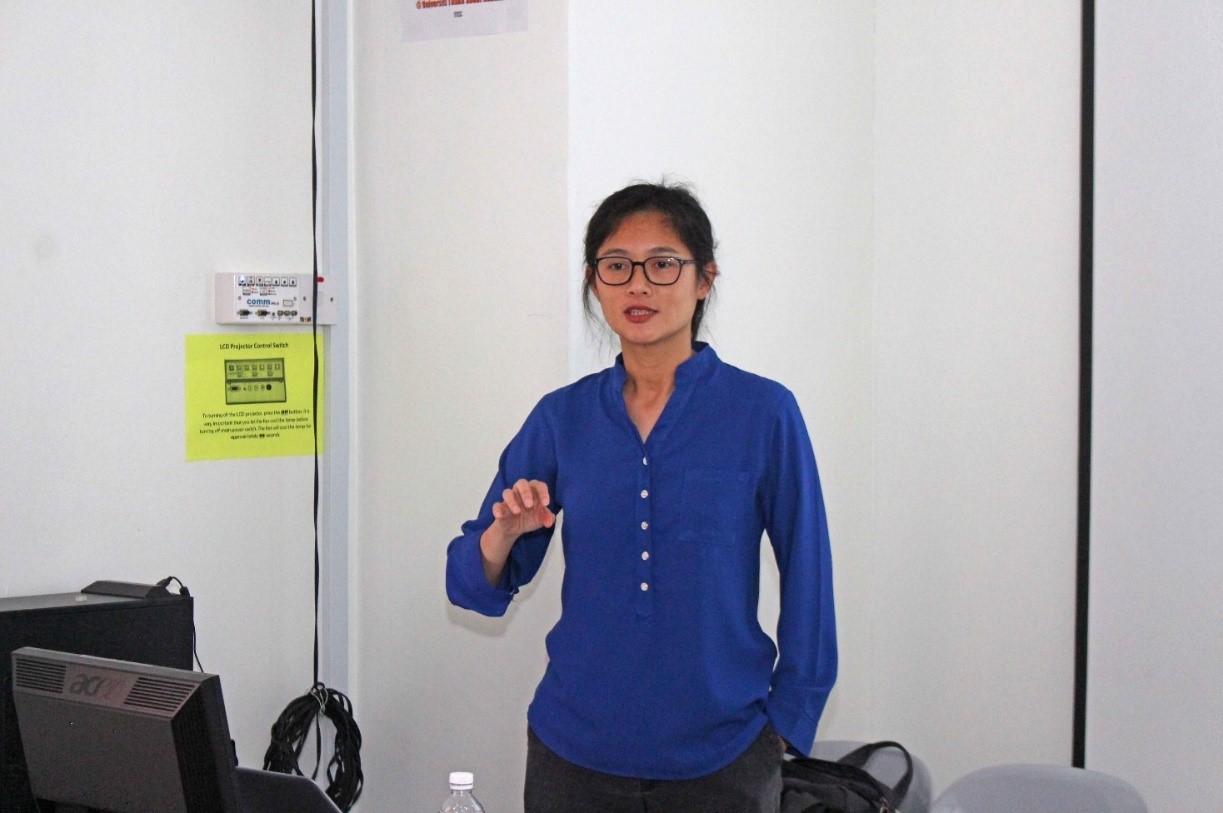
Dr Cheah Phaik Yeong delivering her talk
According to Dr Cheah, research ethics involve what is appropriate when conducting research with human beings. “For example, it is about how to ethically invite individuals to participate in the research and making sure that their consent to participate is valid,” she said and continued, “There is a lot of neglected diseases that affect the poor but there is no enough research conducted in these areas. So we have to conduct more research to collect evidence in order to manage these diseases better. However, the concern here is about exploiting the people. We want to make sure that we strike a balance between protecting disadvantaged populations from research and protecting them through research.”
During the talk, she explained that research ethics guidelines were developed as a result of World War II atrocities and how they inspired the formation of the Nuremberg Code. “During World War II, the Nazis conducted experiments on prisoners as they were vulnerable and were easy targets for human subject research. A lot of people were tortured and killed during the process. The Nuremberg Code was subsequently developed in 1947, stating that the voluntary consent of the human subject is essential and making it clear that the person involved should have the legal capacity to give consent,” she said.
She also gave an explanation about the International Council for Harmonisation (ICH) of Technical Requirements for Pharmaceuticals for Human Use guidelines, adding that it is the main guideline for researchers who conduct drug studies. She further explained that ICH is not a guideline on ethics per se. Rather it is a set of guidelines for drug trials but it has guidelines on the importance of getting informed consent from the subject.
Furthermore, she also shared her thoughts about Council for International Organizations of Medical Sciences’ (CIOMS) guideline during her talk. She mentioned that the CIOMS guideline was recently updated since the last edition in 2002. She then shared three particular sections, in CIOMS’ guideline that she has been working on, which were Data Sharing, Vulnerabilities in Research and Community Engagement.
“When we talk about data sharing, it is about sharing the whole set of data you have collected to a third party. This means we are moving towards a more open and transparent society. However, this can be very controversial; you spent two years on a project and upon gaining the result, you are required to share the data set with other people. Many agree that data should be shared to maximize its utility. However, if you share all the data you have worked hard for, you may feel like your efforts are wasted since others can use it for themselves,” explained Dr Cheah.
She also shared some challenges she faced in conducting research. For example, research in tropical medicine such as malaria takes her to remote places such as rural Cambodia. Moreover, hospitals in such places lack resources required to conduct good quality research.
When asked about her future plans, Dr Cheah said, “I think I will stick around in Southeast Asia conducting research on research ethics as there is a lot to do here.”
The talk ended with a Q&A session, followed by a souvenir presentation from FMHS Dean Emeritus Prof Dr Cheong Soon Keng to Dr Cheah.
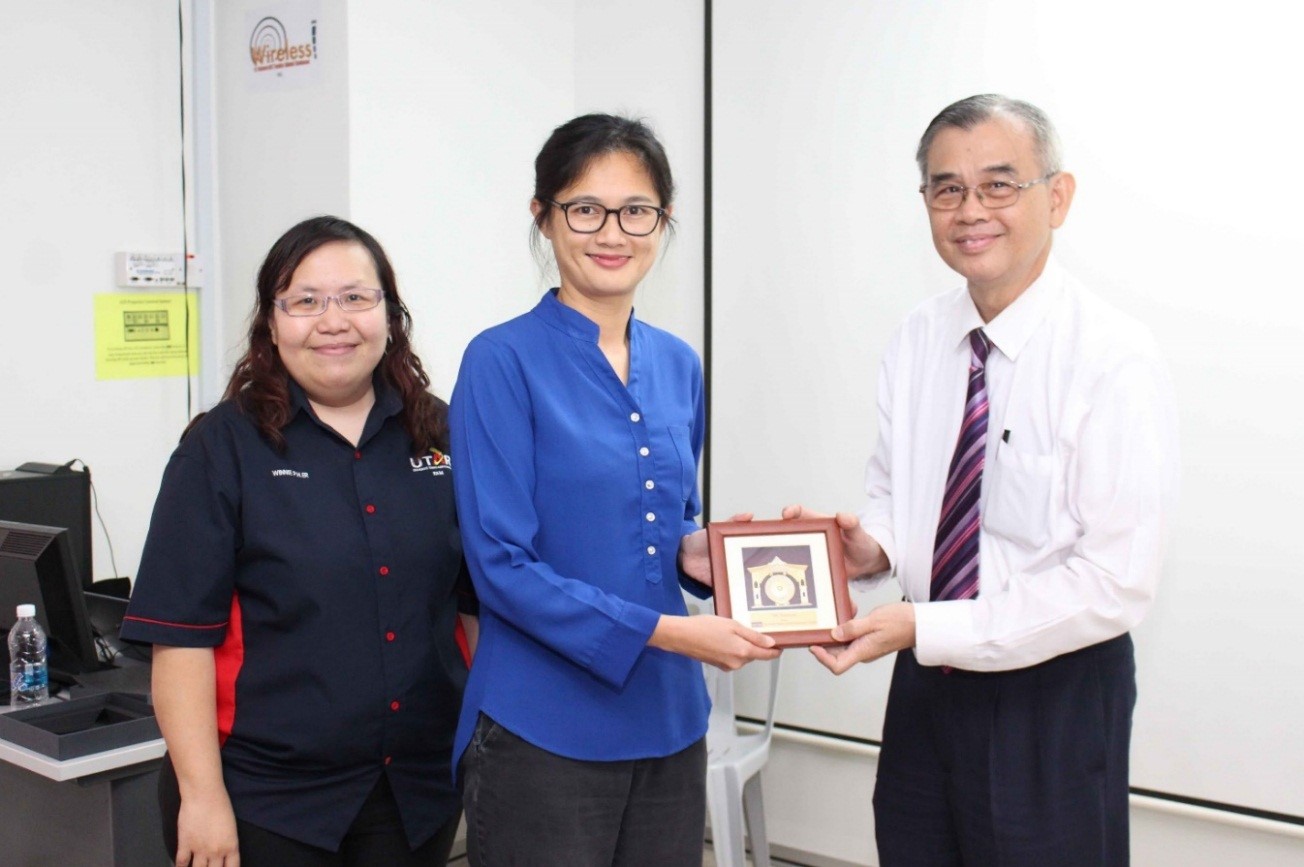
Prof Cheong (right) presenting a token of appreciation to Dr Cheah, while CLT Chairperson Er Pek Hoon looks on
|
| 5 |
The Symposium on Science Education 2018
Co-organized by: Institute of Postgraduate Studies and Research and Centre for Learning and Teaching and Division of Programme Promotion
Date: 18 August, 2018.
Venue: KB104, Block KB, UTAR Sungai Long.
On 18 August 2018, the UTAR Symposium on Science Education (SoSE) 2018 was held. It was jointly organised by the Institute of Postgraduate Studies and Research, the Centre for Learning and Teaching and the Division of Programme Promotion. Approximately 200 educators nationwide turned up at Sungai Long Campus.
Held for the fifth time, SoSE 2018 with its theme ‘Emerging Innovations in the Teaching and Learning of Science and Mathematics’ aimed to share innovative and effective teaching methods in Science, Technology, Engineering and Mathematics (STEM) education and create awareness of the current innovative teaching methods and how to embed innovation in the teaching and learning of STEM education. It also aimed to provide networking opportunities for STEM educators from various schools, colleges and universities.
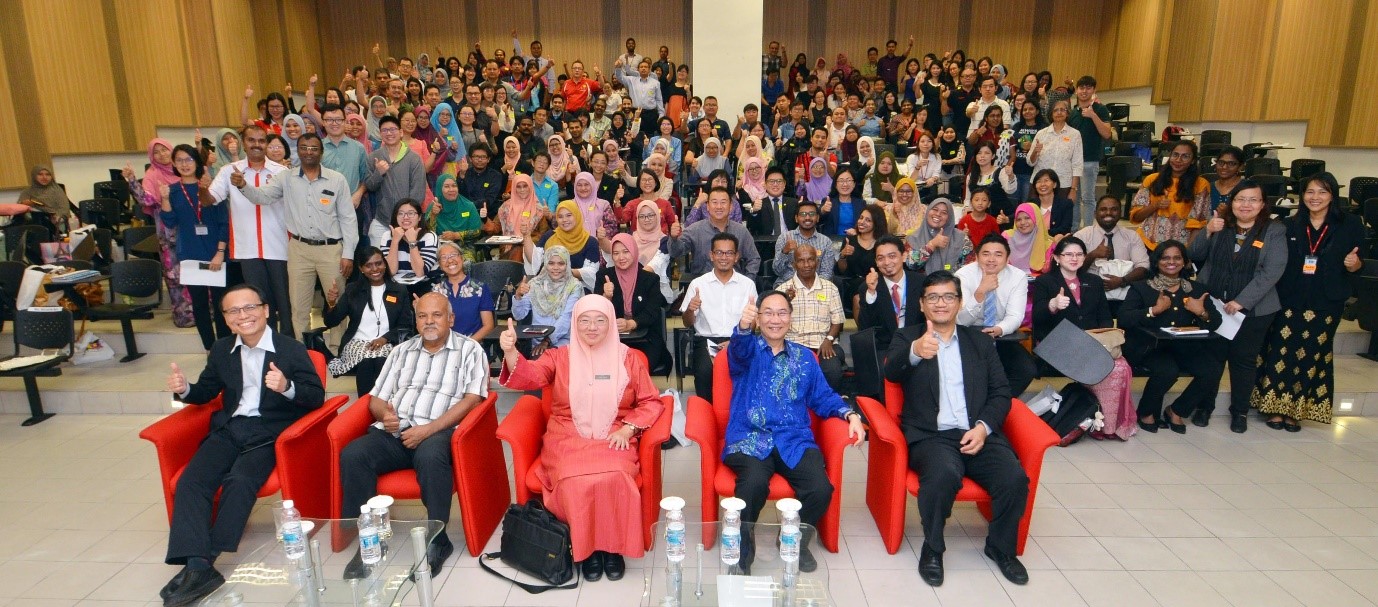
Front row, from left: Prof Lee, Abdul Ghani Abdullah, Dr Habibah, Prof Chuah and Prof Faidz with the participants
Present at the event were Ministry of Education (MoE) Director of Educational Planning and Research Division Dr Habibah binti Abdul Rahim and spouse Encik Abdul Ghani Abdullah, UTAR President Ir Prof Academician Dato’ Dr Chuah Hean Teik, Vice President for R&D and Commercialisation Prof Ir Dr Lee Sze Wei and UTAR Institute of Postgraduate Studies and Research Director Prof Ts Dr Faidz bin Abd Rahman, staff and teachers from various schools and universities.
Prof Chuah welcomed SoSE 2018 participants and said, “STEM education is dear to our hearts. We were looking into how to promote STEM in primary and secondary schools, hence we set up science workshops all around including Sabah and Sarawak.
This particular symposium is important for us to share among ourselves the thoughts and ideas on how to increase the students’ interest in STEM. STEM is not only meant for engineers and scientist; even a Human Resource Manager needs STEM education to perform data analytics to analyse and measure staff performances.”
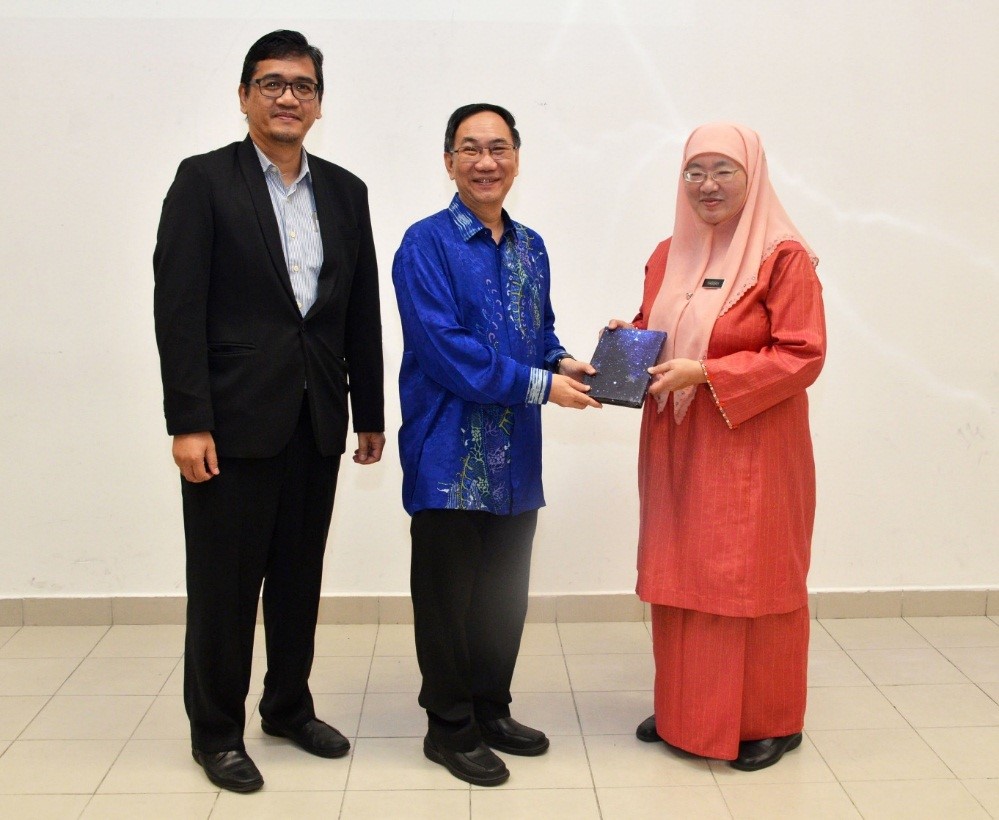
Prof Chuah (middle) presenting the token of appreciation to Dr Habibah as Prof Faidz looks on
In Dr Habibah’s keynote speech, she said, “We need to create a STEM ecosystem to encourage and support STEM among the young generation. Everyone in the community needs to consciously make an effort to create an ecosystem that promotes the application of science in daily life. Things have moved so rapidly from one generation to another; it has given birth to this generation gap. Thus, it is pertinent for us to understand the younger generation in order to provide what they truly need.” Dr Habibah also shared the importance of STEM in the Fourth Industrial Revolution, jobs that require STEM skills, issues and challenges in STEM education, STEM education concepts and goals and educators’ responsibilities in STEM education.
The symposium was followed by four talks which were conducted over two sessions. The session one was presented by Teacher Educational Institute of Technic Educational Campus lecturer Tan Mun Wai and MRSM Terendak, Melaka Head of Science Department and Persatuan Guru STEM Malaysia Chairman Noorsuhaily bin Ali. Speaking at session two were Politeknik Kuching Sarawak lecturer Ho Rui Jin and SMK Seri Sepang V.R. Adlin Premla.
Tan’s talk titled, “Incremental Change” centred on three terms which were Unpack, Focus and Incremental Change. “The term Unpack refers to a state where people throw words at you impulsively. However, it is important that we do not take the words as it is. Instead, we should focus on interpreting the meaning behind the words. The term Focus tells you not to teach everything in one go but to pay attention to training skills that can be translated to other disciplines which promote lifelong learning. Incremental Change is about building one step at a time to see actual progress in students,” said Tan. She added, “We want students to have an explosive knowledge where it is not about how much they know but the ability to continuously learn and master in a short period.”
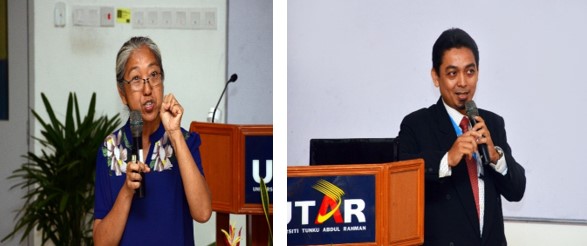
Ms Tan Mun Wai and En. Noorsuhaily sharing their experience to the audience
Noorsuhaily’s talk titled, “Development of STEM Research Skills through GISC for Secondary School and Sharing on International Competition Involvement” focused on the experiences and the process of international competitions in various countries. He shared ideas on interesting projects which were objective and cost-effective, as well as the benefits of students participating in international competitions. He said, “Teamwork is very important because it requires you to be considerate, understanding, respectful and responsible. I believe students who are exposed to such opportunities will be able to build their soft skills and self-confidence and explore new experiences, cultures and knowledge while building international networks.”
Ho, who is also a winner of Malaysia Toray Science Foundation (MTSF), presented his talk titled, “Challenge and Learning Barrier in TVET — Possible Solution”. Ho said, “The challenges are the changes in demographic and structural shifts of trade and industries through the emergence of Industrial Revolution 4.0, big data analytics and artificial intelligence. Besides, the developed syllabus is not up-to-date with the industrial demand and it lacks exposure to new technologies. Hence, it is crucial for any country to participate in the on-going industrial revolution to stay relevant technologically while integrating practical STEM activities since early education.”

Mr Ho Rui Jin and Ms Adlin Premla delivering their talk.
Adlin delivered her talk titled, “Step by Step: Engage the Abstract” which covered the “One Student, One Test tube” (1S1T) teaching method. It is a method where every student will be given the opportunity to learn everything from the practical session. She said, “This method allows students to grasp information at their own pace while boosting their interest to learn and increasing their confidence. This is because students get hands-on and minds-on experiences as they go through the self-paced learning while acquiring manipulative skills to understand the concepts which are taught in the class.” Previously, Adlin has also won the Anugerah Kajian Tindakan JPN Selangor and Anugerah Guru Inovatif Daerah Sepang.
The symposium also saw two parallel workshops; Universiti Pendidikan Sultan Idris Assoc Prof Dr B. Balamuralithara conducted a workshop titled, “Design Your Thinking: A Way for Innovative STEM Education” and Sasbadi Learning Solutions Sdn Bhd Learning Design Developer Aizuddin bin Zamani conducted a workshop titled, “Hands-On Engagement with LEGO Education”.
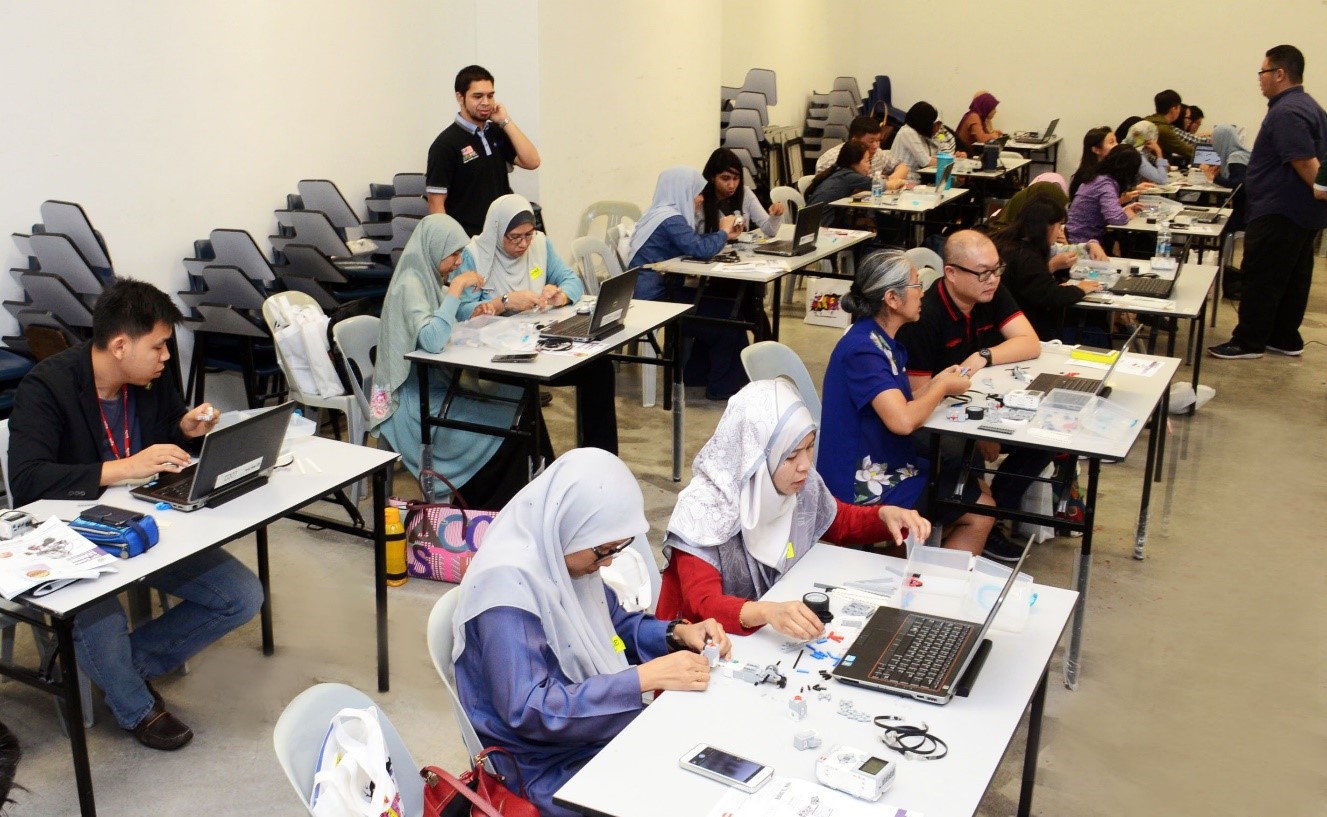
Participants assembling LEGO at the workshop

Participants discussing design thinking during the workshop
CLT members who were on duty were Ms Saraswathy Thurairaj, Ms Mariam Nainan, Ms Michelle Beh, Dr Lee Jer Vui, Dr Kye Mon Min Swe, Dr Priscilla Moses, Dr Tan Pei Meng and the CLT Chairperson, Ms Winnie Er Pek Hoon. During lunch break, CLT members went around interviewing the participants to obtain their feedbacks.
“This is my first time joining the SoSE. I would like to join again next year and I am hoping there will be talks and hands-on workshops that would cover the Physics subject. I have gained information from the insightful talks and the topics were relevant to the current issues,” said Siti Maysarah binti Ahmat from MRSM Tun Ghafar Baba, Jasin, Melaka.
“This is my second time and I hope the valuable lessons I’ve gained will enrich my teaching. The talks have given me a new perspective on different aspects. The skills and methods shared by the speakers were clear and I will consider it in my teaching and I will share it with my students,” said Chow Sed Lie from SMK Convent Taiping.
The workshop was followed by a networking session over refreshment before the symposium ended.

Exhibition booths at the symposium
For video and information on SoSE 2018, please follow the link here: https://www.facebook.com/utar4U/videos/279257012867318/ and https://www.utar.edu.my/sose/.
|

























